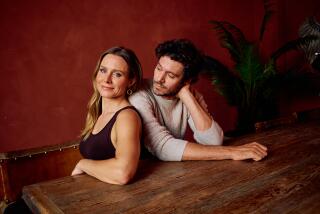Judge Strikes Question on Talk of Having Betty Broderick Killed : Justice: Defense attorney asks her if Daniel Broderick had ever spoken with someone “about having you killed.” Jurors are told to disregard the query.
- Share via
The judge in the second murder trial of Elisabeth Anne (Betty) Broderick warned jurors Friday to disregard a question in which her attorney asked about her ex-husband “having talked to someone about the possibility of having you killed.”
Broderick’s attorney, Jack Earley, later declined comment about whether the defense has a potential witness who may have been party to such a conversation with Daniel T. Broderick III, who was slain Nov. 5, 1989.
The remark first surfaced Friday morning, as Earley asked Broderick, 44, a series of questions about whether her ex-husband had consistently acted in the best interests of the couple’s four children.
Earley asked if Daniel Broderick, 44, a prominent medical malpractice attorney, had “done anything to protect the children” from the effects of his extramarital affair with Linda Kolkena Broderick, 28, his legal assistant who later became his second wife.
Broderick has admitted shooting Daniel and Linda Broderick in the bedroom of their Marston Hills home. Prosecutors see the crime as first-degree, premeditated murder and are seeking a sentence of life in prison without parole.
The defense contends that Broderick went to her former husband’s home near dawn on a Sunday to confront him about continuing problems with divorce- and custody-related issues that had lingered for years, and that she intended only to kill herself.
Last year’s trial ended in a hung jury, with 10 jurors favoring a murder conviction and two holding out for manslaughter.
Earley stunned the courtroom Friday by asking the defendant if Daniel Broderick had ever talked with someone “about having you killed,” and whether such conversations were motivated to “protect the children.”
Broderick began crying and said softly, “Obviously not.”
Deputy Dist. Atty. Kerry Wells did not object, but for the rest of the day, much of the action was limited to heated discussions at the bench among Earley, Wells, Deputy Dist. Atty. Paul Burakoff and Superior Court Judge Thomas J. Whelan.
Later, none of the attorneys would comment on the nature of those discussions.
But, shortly after the lunch recess, Whelan opened the afternoon session with the first of two admonitions to the jury concerning Earley’s question.
“This morning, Mr. Earley asked if Dan Broderick had ever hired someone to kill Mrs. (Elisabeth) Broderick,” Whelan said. “There is no evidence before you that such a statement is true. And the defendant herself is not aware of such an assertion. It’s a mere allegation not relevant to these proceedings. So, disregard that question. The question and answer shall be stricken from the record.”
The question did not come up the rest of the day, except in Whelan’s closing remarks to jurors, who were told to avoid reading newspapers or watching television in case the question of Daniel Broderick “hiring someone to kill” the defendant happened to be reported.
“I know they’re in the business of selling papers,” Whelan said of the press.
Afterward, Earley avoided questions.
“The judge has asked us not to make any comment,” he said.
About what?
“About the evidence that may or may not be introduced in the case. He asked us to make no comment about the evidence.”
Asked if he had a witness, he replied, “I can’t make any comment about the evidence.”
Friday marked the end of Elisabeth Broderick’s appearance on the stand. Whelan began the day with an admonition, telling jurors to disregard a previous prosecution question about Broderick once having had an abortion.
Whelan said he had made a pretrial ruling forbidding questions about an abortion, and said Earley’s objection to the question “should not be viewed as an attempt by Mrs. Broderick to hide information.”
Earley was later allowed to introduce a Marriage Encounter notebook written by Daniel Broderick in 1976. In it, he talks of not being able to attain true happiness in life until he reaches his lifetime dream of massive material wealth.
Earley was prohibited from introducing the book earlier in this trial, although it was entered in last year’s trial. So far, Earley has been unable to introduce a Marriage Encounter notebook written by Elisabeth Broderick.
Don David Lusterman, a psychologist specializing in the study of marital infidelity, testified Friday that the victim of a marriage marred by an extramarital romance often does not recover, because of the “shattering of self-esteem.”
Lusterman, who testified last year as well, acknowledged that he had not made a specific study of the 16-year marriage between Daniel and Elisabeth Broderick.
He described the characters in a real-life, extramarital drama as “the infidel,” “the affairee” and “the victim,” but said only the last person suffers an “incalculable feeling of chaos, despair and rage.”
The Broderick trial resumes Monday in Superior Court.
More to Read
Sign up for Essential California
The most important California stories and recommendations in your inbox every morning.
You may occasionally receive promotional content from the Los Angeles Times.













